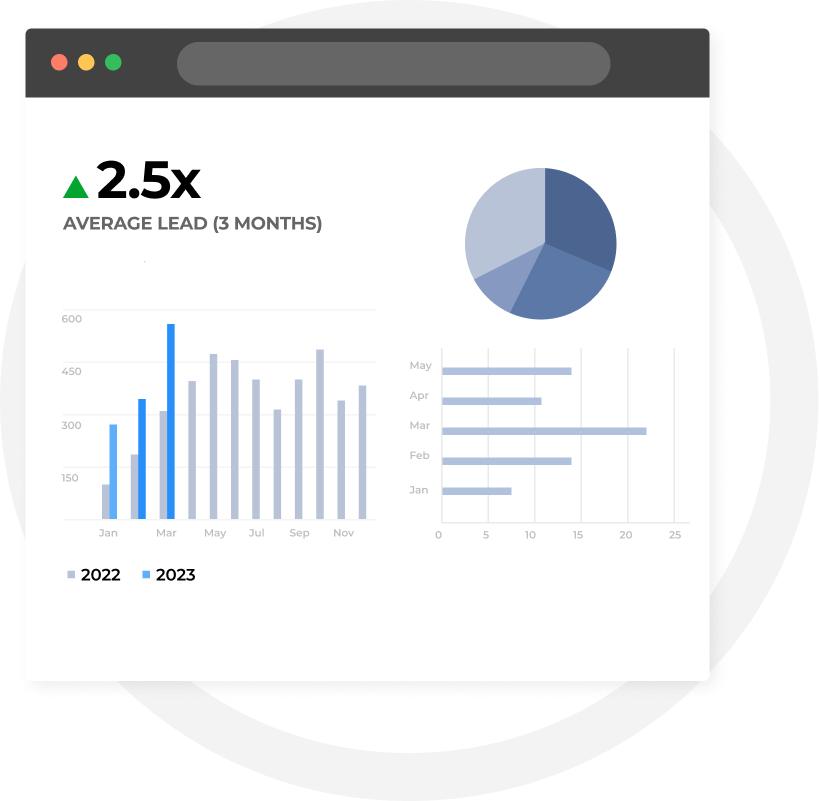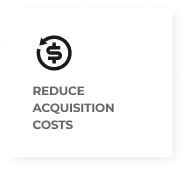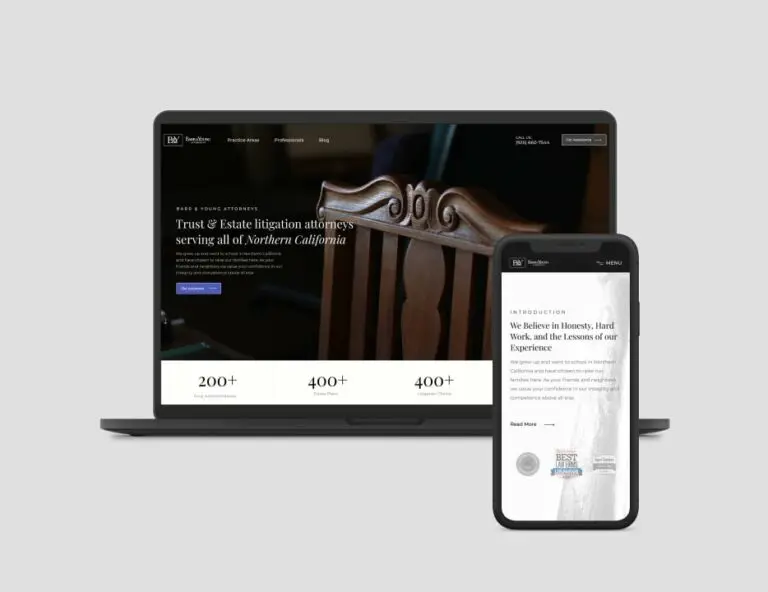PPC Services for Lawyers
Get noticed when it matters most—invest in smart PPC advertising now!
Select goals you want to achieve
We are Recognized as a Leading Lawyer Marketing Agency
PPC for Lawyers: Driving Results Since 2008
Benefits of PPC for Lawyers: Transform Your Law Practice
Law firm PPC advertising helps practices succeed in today's fierce competitive landscape. As a leading lawyer PPC services provider, we help you invest in marketing that puts you above the rest. PPC advertising offers an effective way to elevate your practice, ensuring your services attract more attention than other firms. With the right approach, your law firm can connect with clients who need your expertise and quickly establish a strong online presence. Discover how embracing PPC can transform your practice and drive new business:
- Greater Visibility
PPC advertising places your law firm at the top of search results, ensuring potential clients see your services before your competitors. This prime positioning increases the likelihood of clicks and inquiries, enhancing your firm’s reputation as a go-to resource for legal assistance. - Flexibility and Adaptability
With PPC, you can easily adjust your ad campaigns to reflect changes in your practice or shifts in the legal landscape. This responsiveness allows for real-time optimization of your budget and targeting, ensuring you are always reaching the right audience with the right message. - Quick Results Through Google Ads for Lawyers
Unlike organic SEO efforts, which can take months to yield results, our attorney PPC marketing delivers immediate visibility through optimized Google Ads for lawyers. As soon as your ads go live, your firm can start attracting potential clients, generating leads, and increasing consultations without the long wait. - Localized Marketing
Online advertising enables you to target specific geographic areas, ensuring your firm reaches clients in your immediate vicinity. This local focus not only helps in attracting clients who are searching for nearby legal services but also fosters community engagement, positioning your firm as a local expert.





* Typical results generated for our clients in the first year of our engagement.
Why Comrade Is the Best Law Firm PPC Agency
With over ten years of expertise in legal PPC marketing, our team brings invaluable insights and tailored solutions, ensuring your campaigns are finely tuned to the unique needs of your law firm.
Prioritizing measurable outcomes, we analyze data at every stage of your Google Ads campaign. This allows us to optimize continuously, ensuring your marketing budget delivers the best possible return on investment.
Our strategic approach targets individuals actively seeking legal assistance, ensuring a consistent flow of qualified leads while enabling your firm to build lasting client relationships.
Our Results
Comprehensive Lawyer PPC Services & Legal PPC Advertising
Over 330 Clients Rely on Comrade's Services
Take your law firm to the next level. Book a complimentary audit today
- Firm’s Reputation
- Web Presence
- Rank Competitors
- Potential Demand
- Website Performance
- Overall Score

Here's What Lawyers Need to Know about PPC Advertising
How can I improve my Quality Score?
Improving your Quality Score is essential to maximize ad visibility and lower costs. Start by optimizing ad relevance by making sure your ad copy closely matches keywords that potential clients search. Enhance your landing page experience by ensuring it’s fast, mobile-friendly, and provides content relevant to both the ad and keyword. Use high-performing keywords, and consistently test ad copy variations to see what resonates best with your audience. Regularly monitoring and adjusting bids and targeting can also lead to better Quality Scores.
What should my law firm's landing page include?
An effective law firm landing page for your PPC campaign should be clear, focused, and compelling. Include a strong headline that incorporates relevant keywords addressing the specific legal services your firm offers, followed by a concise summary of benefits and services aligned with your law firm’s PPC strategy. Add client testimonials, trust symbols (like certifications or awards), and a visible call-to-action (CTA) button for quick access to consultations, ensuring that the page is optimized to perform well in search engines. The page should also be mobile-friendly, load quickly, and feature contact information in multiple formats—phone, form, or chat options for immediate access.
How Do I Track Law Firm PPC Campaign Success?
To track your PPC campaign’s success, integrate Google Analytics and conversion tracking into your paid search campaign. Set up clear conversion goals, such as form submissions, phone calls, or live chat initiations to gauge effectiveness. Key metrics to monitor include click-through rates (CTR), conversion rates, cost per click (CPC), and cost per acquisition (CPA). Regularly reviewing these metrics can help identify which ads are driving leads and which might need refinement to improve ROI.
What is a PPC audit, and why should my law firm conduct one?
A PPC audit is a comprehensive review of your pay-per-click campaign performance. It helps identify inefficiencies, such as poorly performing keywords, low-quality scores, or ads with low engagement. Conducting an audit can reveal hidden opportunities to improve ad copy, targeting, and bidding strategies. For law firms, this is crucial as it can reduce wasted spend, improve conversion rates, and ensure your ads reach potential clients effectively. Regular audits keep your campaigns cost-effective and results-focused.
Should I focus on long-tail or short-tail keywords for my law firm’s PPC campaigns?
Long-tail keywords are typically more specific (e.g., “Dallas DUI defense attorney”) and often have lower competition and cost-per-click, making them ideal for law firms targeting niche services. Short-tail keywords (e.g., “lawyer”) are highly competitive and costly but can capture a broader audience. Focusing on long-tail keywords helps attract qualified leads with clearer intent to hire legal services, which often leads to higher conversion rates and better ROI, especially for local and specialized law practices.
What are some best practices for writing effective PPC ad copy?
Effective PPC ad copy requires clarity, relevance, and a compelling call to action. Start by addressing a specific pain point or legal need, then communicate your unique value proposition concisely. Use powerful words like “expert,” “trusted,” or “experienced” to build credibility. Adding location-based keywords can also boost relevance. Finish with a clear CTA—such as “Schedule a Consultation Today!”—to guide users toward conversion. Testing various ad copies can help refine what resonates best with your audience.
Contact us to schedule a no strings attached free consultation with a legal marketing expert

We will evaluate:
- How fast your website loads
- Backlink quality (and determine if any may lead to penalties on Google)
- SEO performance based on 20 unique factors
- Content performance
- Conversion rate (how many website visitors become client leads)
Our comprehensive legal PPC advertising evaluation comes with an actionable law firm marketing plan to help generate positive results for your law practice.

Let's Get Started
Chat With Our Specialists or Call Us
(872) 242 1074











